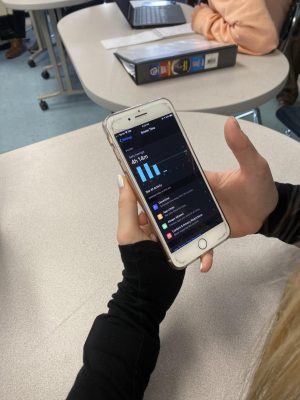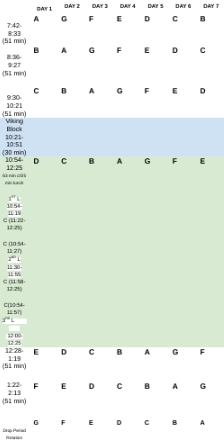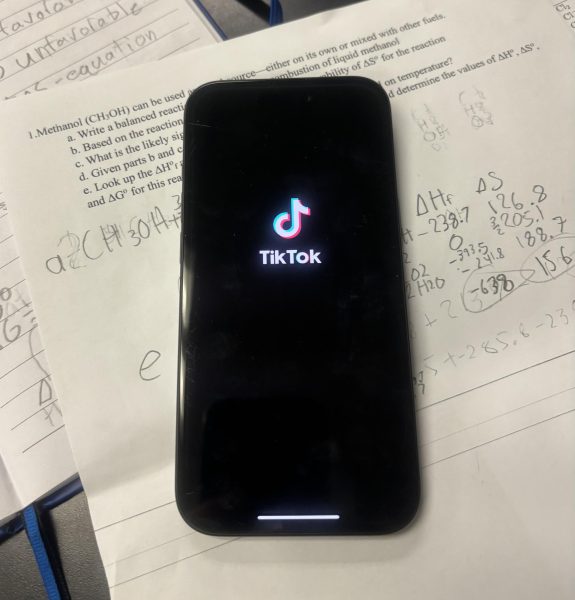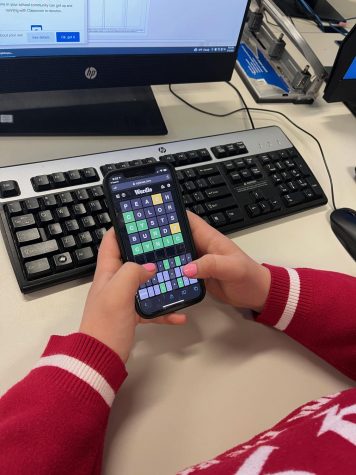The Truth Behind the Screen
How much time do we really spend on our phones?
Junior Nathaniel Howard and Senior Marcella Hubbard – Brucher secretly use their phones in class
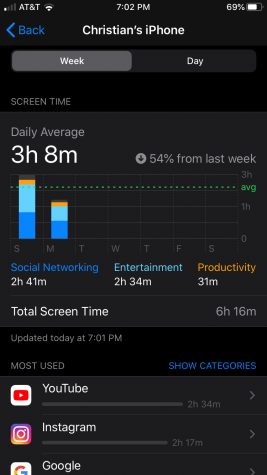 Hiding it under their desks, students glance down at their phones in class. They keep their eyes trained on the teacher, betraying their attention to Mario Kart just below their line of sight.
Hiding it under their desks, students glance down at their phones in class. They keep their eyes trained on the teacher, betraying their attention to Mario Kart just below their line of sight.
This bothers both teachers and parents.
“I don’t feel like teenagers should really have phones,” said Triton Parent Lori Flodman. “We all managed when we didn’t have a phone … For a long time we had a wall phone with a chord and we survived.”
The screentime feature on most phones tracks the amount of time that is spent on a user’s phone, and even says how much time is spent on certain apps. It goes as far as reporting how many times a user checked their phone for notifications, versus how many notifications they actually got. This detailed analysis is available in settings, but there is also a quick update at the beginning of every week in notifications. The purpose of this feature is to alert users of how much time they are spending on their phones.
With the newly developed awareness, users can set limits on the amount of time that is spent on a certain app. The goal is to help users eliminate their phone addiction. According to research conducted by Common Sense Media, 52 percent of teens think they are addicted to their phones.
Triton Biology teacher Ms. Jamie Richards discussed her dependency on her phone, “It says I spend about two hours per day,” she reported.
Richards noted that this number may seem minuscule compared to others in her generation. She spends most of her time on Safari (the Internet), or her email, whereas others her age would spend most of their time on social media.
Flodman agreed with Richards. “Most of the time I spend on my phone is for work, or to talk to my kids who live far away,” she said.
Teenagers, however, have a different relationship with their cellular devices. Sophomore Christian O’Connell anticipates he spends about four hours per day on his phone, looking at either Instagram or Youtube. After he pulled up the statistics on his iPhone, he found he spent a daily average of five hours and 17 minutes on his phone. “This doesn’t surprise me at all,” he said.
Senior Naomi Bell guesses she spends between eight and ten hours a day on her phone. “I definitely spend most of my time on Tik Tok and Instagram” she guessed.
In reality, she discovered that she spent a daily average of 7.5 hours, the most common apps being Youtube and Snapchat. She recommends teenagers spend at least 10 hours per day on their phones in order to stay connected to the social digital world.
Considering these statistics, do teenagers have a healthy dependency on their phones? “Yes, 100 percent,” said Bell. “It’s important to maintain that connection,” she said.
Richards, on the other hand, disagrees. “My students spend so much time on their phones, it’s crazy. We never did that when I was in high school,” she said.
Richards utilizes the “phone pockets” that are in almost every classroom in Triton. Each student is required to put their phone in a pocket at the beginning of class unless otherwise instructed. If they are caught using it without permission, their phone will instantly be taken away for the whole day.
As both students and adults are finding phone usage increasing, they look to see what they can do to diminish the amount of time spent staring at a screen. According to Common Sense Media, 37 percent of students recognize they need to lower their phone usage, but they choose not to. Expert Holland Hiias suggests exercising when you feel the urge to go on your phone.
“It’s a vicious cycle and in order to break that cycle, you need to find the same unpredictability and stimulation which is out there if you are exercising,” he said.
Too much screen time can result in sleep disturbances, academic problems, and even obesity, according to The May Creation. Children’s brains are still developing, and the excess amount of screentime can damage the frontal lobe. This damage can lead to issues with impulse control, as well as a child’s ability to show empathy and compassion.
Reviewing screen time has alerted us to the extreme amount of time spent staring at our phone screen, proving our addictions. “I’m definitely addicted,” said Bell. “My phone is a part of me.”

Hi! My name is Alexandra Flodman and I am a junior at Triton High School. In school, I love swimming on the Swim Team, as well as participating in VTV....




